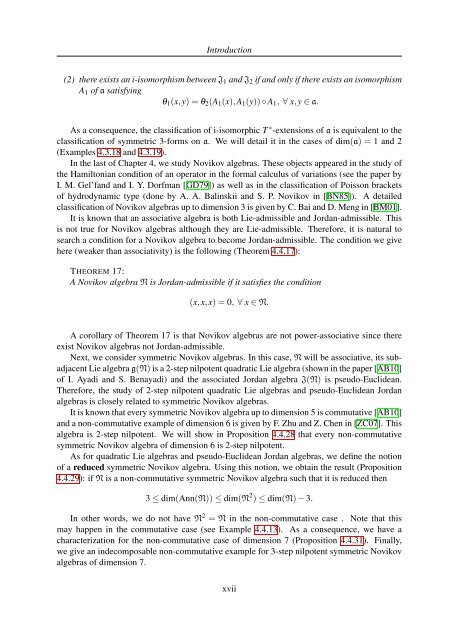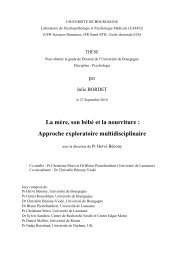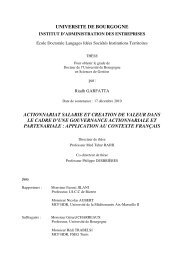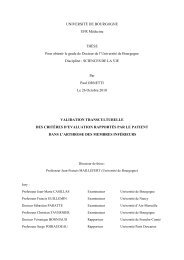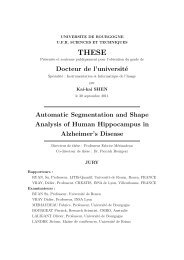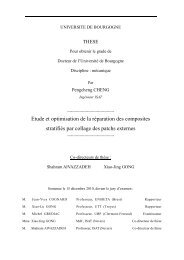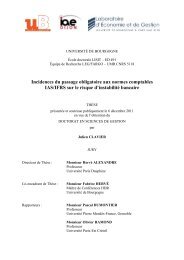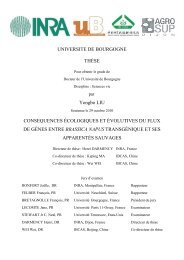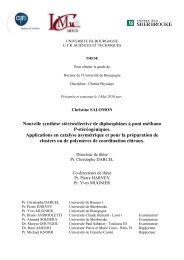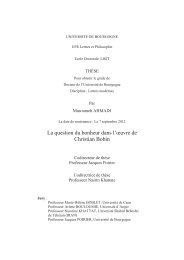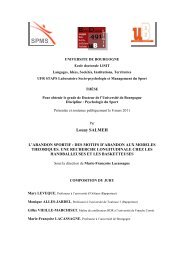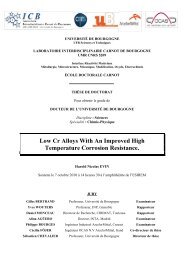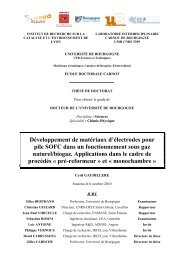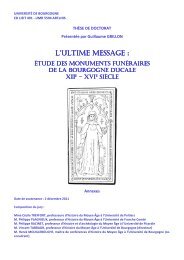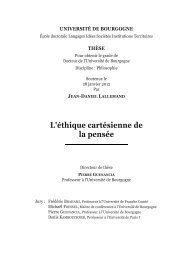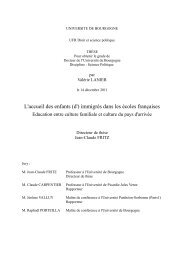TH`ESE A NEW INVARIANT OF QUADRATIC LIE ALGEBRAS AND ...
TH`ESE A NEW INVARIANT OF QUADRATIC LIE ALGEBRAS AND ...
TH`ESE A NEW INVARIANT OF QUADRATIC LIE ALGEBRAS AND ...
You also want an ePaper? Increase the reach of your titles
YUMPU automatically turns print PDFs into web optimized ePapers that Google loves.
Introduction<br />
(2) there exists an i-isomorphism between J1 and J2 if and only if there exists an isomorphism<br />
A1 of a satisfying<br />
θ1(x,y) = θ2(A1(x),A1(y)) ◦ A1, ∀ x,y ∈ a.<br />
As a consequence, the classification of i-isomorphic T ∗ -extensions of a is equivalent to the<br />
classification of symmetric 3-forms on a. We will detail it in the cases of dim(a) = 1 and 2<br />
(Examples 4.3.18 and 4.3.19).<br />
In the last of Chapter 4, we study Novikov algebras. These objects appeared in the study of<br />
the Hamiltonian condition of an operator in the formal calculus of variations (see the paper by<br />
I. M. Gel’fand and I. Y. Dorfman [GD79]) as well as in the classification of Poisson brackets<br />
of hydrodynamic type (done by A. A. Balinskii and S. P. Novikov in [BN85]). A detailed<br />
classification of Novikov algebras up to dimension 3 is given by C. Bai and D. Meng in [BM01].<br />
It is known that an associative algebra is both Lie-admissible and Jordan-admissible. This<br />
is not true for Novikov algebras although they are Lie-admissible. Therefore, it is natural to<br />
search a condition for a Novikov algebra to become Jordan-admissible. The condition we give<br />
here (weaker than associativity) is the following (Theorem 4.4.17):<br />
THEOREM 17:<br />
A Novikov algebra N is Jordan-admissible if it satisfies the condition<br />
(x,x,x) = 0, ∀ x ∈ N.<br />
A corollary of Theorem 17 is that Novikov algebras are not power-associative since there<br />
exist Novikov algebras not Jordan-admissible.<br />
Next, we consider symmetric Novikov algebras. In this case, N will be associative, its subadjacent<br />
Lie algebra g(N) is a 2-step nilpotent quadratic Lie algebra (shown in the paper [AB10]<br />
of I. Ayadi and S. Benayadi) and the associated Jordan algebra J(N) is pseudo-Euclidean.<br />
Therefore, the study of 2-step nilpotent quadratic Lie algebras and pseudo-Euclidean Jordan<br />
algebras is closely related to symmetric Novikov algebras.<br />
It is known that every symmetric Novikov algebra up to dimension 5 is commutative [AB10]<br />
and a non-commutative example of dimension 6 is given by F. Zhu and Z. Chen in [ZC07]. This<br />
algebra is 2-step nilpotent. We will show in Proposition 4.4.28 that every non-commutative<br />
symmetric Novikov algebra of dimension 6 is 2-step nilpotent.<br />
As for quadratic Lie algebras and pseudo-Euclidean Jordan algebras, we define the notion<br />
of a reduced symmetric Novikov algebra. Using this notion, we obtain the result (Proposition<br />
4.4.29): if N is a non-commutative symmetric Novikov algebra such that it is reduced then<br />
3 ≤ dim(Ann(N)) ≤ dim(N 2 ) ≤ dim(N) − 3.<br />
In other words, we do not have N 2 = N in the non-commutative case . Note that this<br />
may happen in the commutative case (see Example 4.4.13). As a consequence, we have a<br />
characterization for the non-commutative case of dimension 7 (Proposition 4.4.31). Finally,<br />
we give an indecomposable non-commutative example for 3-step nilpotent symmetric Novikov<br />
algebras of dimension 7.<br />
xvii


